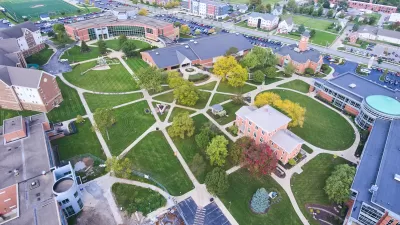In an opinion piece for The Wall Street Journal, James Piereson and Naomi Schaefer Riley argue that its time for educational institutions to pay their fare share of taxes to support the communities in which they reside.
"As cities and towns struggle to pay for public services, it's hard to blame public officials and taxpayers for wondering why well-off educational institutions aren't sharing the load for police and fire departments, sanitation and road maintenance," write Piereson and Schaefer. "The reason they don't dates to 1917, when Congress decided that educational institutions, which then operated on a far more modest scale, should be exempt from federal income taxes."
"In the intervening decades, some schools like Johns Hopkins, Yale and Duke have worked out Pilot (payment in lieu of taxes) programs with cities or towns," they add. "But these donations fall well below what the universities would owe in taxes."
In lieu of Pilot deals, which are "often secretive and contentious", the authors suggest "it's time to treat universities like for-profit enterprises."
FULL STORY: James Piereson and Naomi Schaefer Riley: Why Shouldn't Princeton Pay Taxes?

Planetizen Federal Action Tracker
A weekly monitor of how Trump’s orders and actions are impacting planners and planning in America.

Restaurant Patios Were a Pandemic Win — Why Were They so Hard to Keep?
Social distancing requirements and changes in travel patterns prompted cities to pilot new uses for street and sidewalk space. Then it got complicated.

Maui's Vacation Rental Debate Turns Ugly
Verbal attacks, misinformation campaigns and fistfights plague a high-stakes debate to convert thousands of vacation rentals into long-term housing.

In California Battle of Housing vs. Environment, Housing Just Won
A new state law significantly limits the power of CEQA, an environmental review law that served as a powerful tool for blocking new development.

Boulder Eliminates Parking Minimums Citywide
Officials estimate the cost of building a single underground parking space at up to $100,000.

Orange County, Florida Adopts Largest US “Sprawl Repair” Code
The ‘Orange Code’ seeks to rectify decades of sprawl-inducing, car-oriented development.
Urban Design for Planners 1: Software Tools
This six-course series explores essential urban design concepts using open source software and equips planners with the tools they need to participate fully in the urban design process.
Planning for Universal Design
Learn the tools for implementing Universal Design in planning regulations.
Heyer Gruel & Associates PA
JM Goldson LLC
Custer County Colorado
City of Camden Redevelopment Agency
City of Astoria
Transportation Research & Education Center (TREC) at Portland State University
Jefferson Parish Government
Camden Redevelopment Agency
City of Claremont





























